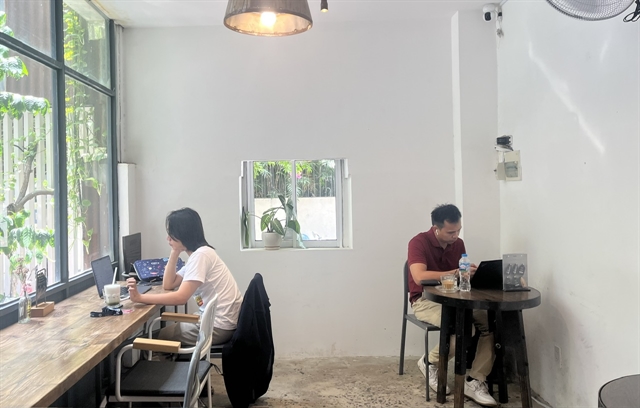As Việt Nam’s economy grows, so do the ambitions of its middle class, yet a frozen personal income tax system is holding them back. Professionals say the system punishes effort, curbs motivation, and fails to reflect the rising costs of modern life. Bồ Xuân Hiệp reports.

Bồ Xuân Hiệp
Phạm Minh Quang, a 35-year-old software engineer in HCM City, had waited months for a raise. When it finally came, a modest VNĐ5 million (nearly US$200), he hoped it would help cover school fees, rent, and rising food prices.
But most of it never reached his bank account.
“As much as 35 per cent of it disappeared in taxes,” he said. “It’s hard to stay motivated when a third of your hard work vanishes before you can use it.”
Quang’s monthly income places him in Việt Nam’s highest personal income tax (PIT) bracket, which is 35 per cent for earners above VNĐ80 million ($3,150) per month.
But like many in Việt Nam’s growing middle class, he doesn’t feel wealthy. He feels stuck working harder, paying more, and getting little in return.
“I want to contribute to society,” he said, “but the system doesn’t seem fair.”
His situation reflects a growing frustration among professionals in major cities such as HCM City and Hà Nội, where a 16-year-old PIT regime, which has been unchanged since 2009, is increasingly out of step with modern life.
Over that time, Việt Nam’s per capita GDP has more than doubled, while urban living costs such as housing, healthcare and education have soared.
“It’s like we’re living in 2025 with a tax system from 2009,” said economist Nguyễn Đức Thành, former director of the Institute for Economic and Policy Research.
“The brackets no longer reflect reality. What once applied to the ‘top 1 per cent’ now includes ordinary professionals.”
The result, he said, is a system that punishes effort and discourages productivity.
Scaling back to avoid taxes

Lê Mai Anh, a 40-year-old marketing executive in Hà Nội, said she deliberately limits her income to avoid entering higher tax bands.
“I used to work nonstop during weekends, late nights, everything,” she said. “But when I started doing the math, I realised I was keeping only 65 per cent of what I earned. Now, I just take on a few projects a month.”
She’s not alone. Others are scaling back hours, declining promotions, or shifting to freelance work, not because they lack ambition, but because ambition comes with a tax penalty.
And with little social safety net (no free healthcare, public pensions, or housing support) many are questioning what their taxes are actually buying.
“In developed countries, yes, tax rates are high,” said one senior executive, who declined to be named, at a Hong Kong-based multinational sourcing company.
“But you get something back such as free education, hospitals, retirement benefits. Here, we pay 35 per cent and still pay for almost everything ourselves,” he told Việt Nam News.
A recent study found that middle-income earners in HCM City now face a harder path to home ownership than their counterparts in Singapore, where the top PIT rate is just 22 per cent.
“We’re taxing like a rich country,” he said, “but offering the services of a poor one.”
In 2024, PIT contributed over VNĐ189 trillion ($7.4 billion) to the national budget — more than 9 per cent of total revenue.
But Việt Nam’s estimated 5.2 million household businesses, many of them informal, paid just VNĐ26 trillion.
“Formal workers can’t hide income as it’s taxed at the source,” said a tax lawyer in HCM City. “But high-net-worth individuals and small business owners often find ways around it.”
Meanwhile, corporate tax rates have dropped from 32 per cent in 2000 to just 20 per cent today, with further cuts expected in 2025 for small businesses.
“The message to companies is: grow and we’ll reward you,” the lawyer said. “To individuals: earn more and we’ll tax you harder.”
A chance for reform

Việt Nam’s current PIT framework includes seven brackets, ranging from 5 per cent to 35 per cent. However critics say the lower brackets are too close together, pushing middle-income earners into higher tax bands after even modest salary bumps.
A new draft PIT bill proposes reducing the number of brackets from seven to five. Both proposed options retain the lowest rate of 5 per cent (for monthly taxable income of over VNĐ10 million) and the highest at 35 per cent, but Option 2 raises the threshold for the top rate to VNĐ100 million from VNĐ80 million.
Experts broadly support simplifying the system but warn that sharp increases between brackets, especially from 5 per cent to 15 per cent, could burden middle-income earners.
“Taxpayers earning around VNĐ30-32 million a month could see their tax rate jump to 25 per cent, 5 per cent higher than today,” said Âu Thị Nguyệt Liên of Nguyễn Tất Thành University.
Others, like economist Trần Văn Tùng, have urged policymakers to reinstate the 10 per cent tax bracket for monthly incomes between VNĐ15 million and 30 million, and to cap the top rate at 30 per cent.
“Việt Nam should not maintain a 35 per cent top rate when average incomes remain low,” he said. “A cap of 25-30 per cent would align better with corporate tax and regional peers.”
Nguyễn Thùy Dương, director in the Global Mobility Services division at KPMG Vietnam, said Option 2 shows progress by shifting the top tax threshold to VNĐ100 million, but the 35 per cent rate still stands out as uncompetitive.
She recommended adjusting the top rate to 30 per cent in line with Malaysia, Indonesia, and Thailand, whose top PIT rates range from 24 to 30 per cent.
Across Asia, PIT systems vary widely, from two brackets in Albania to 13 in Singapore. Some countries apply top rates as high as 45 per cent, such as Japan and South Korea, but typically at much higher income levels and with more generous public benefits.
“We need a system that balances fairness, competitiveness, and incentive,” said Lê Khánh Lâm, PhD, vice general director of RSM Vietnam. “It should reward work, encourage saving, and reflect today’s economy, not the one we had in 2009.”
Back in HCM City, Quang said he hadn’t lost hope, but he was watching closely.
“I’m willing to pay taxes. That’s part of being a good citizen,” he said. “But it has to feel fair. And right now, it doesn’t.”
His dream is simple: to work hard, get ahead, and provide a better life for his family.
“But if the system doesn’t change,” he said, “more people will start asking: what’s the point?” VNS





